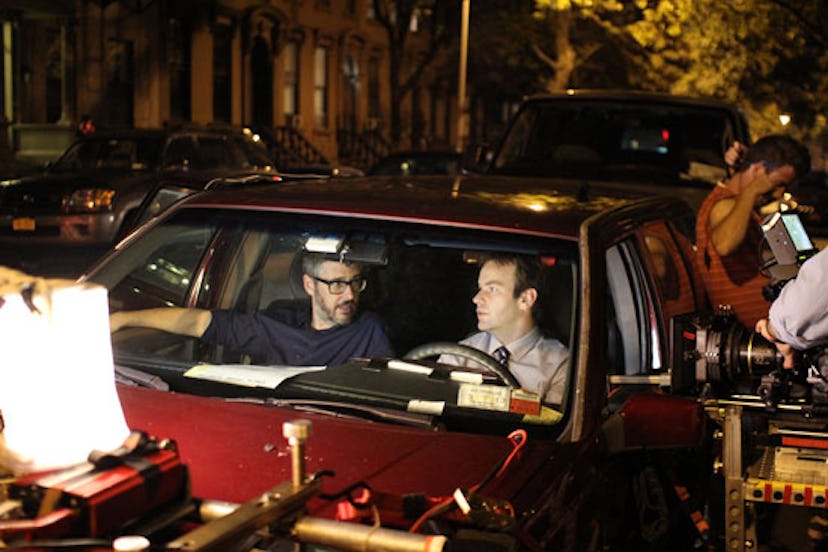FIVE MINUTES WITH Ira Glass
Ira Glass first booked stand-up comedian Mike Birbiglia on This American Life in 2008, and liked what he had to say enough to make him a regular contributor to the acclaimed NPR show. Birbiglia, you...

Ira Glass first booked stand-up comedian Mike Birbiglia on This American Life in 2008, and liked what he had to say enough to make him a regular contributor to the acclaimed NPR show. Birbiglia, you see, was having trouble sleeping, and the more he worried about life’s big struggles—about commitment, relationships, career, and the rest of the lot—the faster he spiraled into a bad case of REM behavior disorder, a night-bound struggle that caused him not just to sleepwalk, but to break glass and hurl himself out of a second-story window. Out of that raw material came this year’s Sundance low-budget darling, Sleepwalk With Me—34-year-old Birbiglia’s account of the awkward straddle between his 20s and 30s. Glass, who opted into the film as screenwriter and co-producer, spoke to W about youthful dreams, what it takes to tell a good story, and why threesomes are a bad idea.
As a little boy, you wanted to be an astronaut. Did you ever want to try your hand at filmmaking? No—I didn’t have any ambition of making movies because I just didn’t think that big. It seemed unreachable. Somehow, becoming an astronaut seemed like a more viable career choice than cinema.
I’ve heard you say that you related very much to the storyline of Sleepwalk With Me—something about being lost in your 20s, dealing with relationships and careers. . . . . . and especially denial. I related to the character, who was involved with somebody and unsure if he should stay with her. I feel like every adult has been in that situation—most of us from both sides—and know how weirdly painful it is from either side. He’s not sure he wants to stay in a relationship, but he’s frightened to get out of it, so he’s just stuck there.
Is there anything that surprises you now that you’re older—anything that you’ve come to embrace? I’m so glad to be married and out of the game. I see friends that are single and think, “You poor bastards.” And in my 20s, while I was very directed, I wasn’t very good at being a writer and a reporter; it took me years until I was able to make a living at it. So I’m glad not to have that huge question mark in my life anymore.
Being married and out of the game at a certain age—is that a predisposition? Some people seem destined to be players for their entire lives. I’m just not built for that kind of thing. I’m not the sort of person who could cheat on someone; I’m too much of a pleaser, too worried about other peoples’ opinions. I wouldn’t want them to be angry with me. It’s a bunch of feelings that aren’t that sophisticated. In the same way, I could never have a three-way. Having sex with one other person—that’s plenty! Worrying about two other people would be just mind-bending.
You made a very funny film. What do you think is the secret to good comedy? Working with a professional comedian who is much funnier than I am. We would be doing little plot fixes in the script, and he would produce a funny line on any turn, whenever we needed one.
You come across so many manuscripts for This American Life. What’s the hallmark of a compelling story? There’s a thing that happens in music when a certain melody will stick in your head. Weirdly, the same thing is true for a story—there’s something about the plot and the characters that just glue into you. There has to be somebody you can relate to and can imagine being. And then it has to be surprising—you need to have turns, especially if you’re doing stories about everyday life. For the radio, because it’s such a talkie medium, you need the story to drive at some idea about the world that you haven’t thought of before. But in real life when we tell each other stories, the story will almost always come to some conclusion, some opinion or thought. You don’t need that in a movie, but it’s funny: This particular movie conforms to all those rules. In that way, you can feel the flavor of the radio show wafting over the film.
You are a famed wearer of glasses. What’s the story behind Ira Glass’s glasses? These are the second pair of glasses I’ve gotten in this style. The first pair was by Bada; these are by Dita. The Bada ones I got in the early 90s when I moved to Chicago. Then they stopped making them, so I wore them out until the sides were white and then basically found a pair that looked exactly like them. I’ve never worn contacts—I like having a wall between me and the world.
Like Clark Kent. But never turning into Superman. That’s the key.
Photo: Copyright © 2006 – 2012 The Independent Film Channel LLC. All rights reserved.